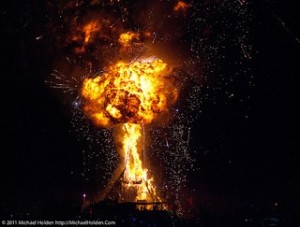Learning From Burning Man
Aug 28th, 2012 | By admin | Category: Other ResourcesBy Suzanne York, www.howmany.org.
Man to burn next weekend!
Are those global warming pushers behind this? No, it’s Burning Man, and it happens every year. What, you may ask, is Burning Man? As some of you probably know, it’s an annual week-long gathering of artists in the Black Rock desert of Nevada (dubbed Black Rock City) that has been going on since 1986, and culminates in the burning of a giant effigy of a man.
The official website states it better: “Trying to explain what Burning Man is to someone who has never been to the event is a bit like trying to explain what a particular color looks like to someone who is blind.”
If you want a more concrete definition, the website does define it as an “annual experiment in temporary community dedicated to radical self-expression and radical self-reliance.” Initially it was a gathering of anti-establishment types, but today today it is a big business, with attendance now capped at 50,000 people.
Each year there is a theme, and for 2012 the focus is Fertility 2.0. It is not about reproduction per se, or women’s rights, but asks people to contemplate the tendency of any being or living system to create abundant life. It is intriguing that festival organizers have chosen this theme in the midst of an election year which has often had a focus on fertility and contraception – which the mainstream media has dubbed the “War on Women”. We of course hope that Fertility 2.0 will encourage people everywhere to consider helping the world move towards replacement level fertility – which happens to be about 2.0.
To quote again from the Burning Man website – “Black Rock City is a kind of Petri dish. Theme camps cling in fertile clusters to its latticework of streets, artworks tumble out of it, like pollen on the air. These nodes of interaction mutate, grow and reproduce their kind. This year’s art theme contemplates the tendency of any being or living system to create abundant life.”
What can the rest of our society take from this? The Earth itself is a petri dish for humankind. We live in a world of over 7 billion people – projected to be over 9 billion by 2050 – with limited planetary resources. What happens in one place often affects another. The increased CO2 in the atmosphere is skewing weather patterns all over the globe. And nature is treated by many as a product to be exploited by humans, with unknown consequences of our impact. We live in technology-obsessed world, removed from the land that supports us, and where individualism is a sacred tenet, at least in American culture.
The festival itself promotes limited consumption, oneness with nature, and working together. If we choose to, we can learn a lot by adhering to the 10 Principles of Burning Man. Here are a few in particular that relate to population growth, human rights, well-being, and endless economic growth:
- Decommodification – Burning Man resists the substitution of consumption for participatory experience.
- Communal Effort – the Burning Man community values creative cooperation and collaboration.
- Leaving No Trace – Burning Man is committed to leaving no physical trace of our activities wherever we gather. We clean up after ourselves and endeavor, whenever possible, to leave such places in a better state than when we found them.
- Participation – We believe that transformative change, whether in the individual or in society, can occur only through the medium of deeply personal participation.
Just imagine if the world today agreed to live and govern upon similar principles. It’s not being idealistic (though many people would claim that it is), but something that is in our power to undertake, for the health of our communities and the environment.
The way most people live on the planet is unsustainable. We act and consume without much thought to future generations. If we take care of what we have today, and live within our means, we can have healthier and more fulfilling lives. We don’t need to meet up in the desert once a year to reaffirm this, but make it part of daily life.
Let’s leave the final word to the founders, as it hits the nail on the head and puts things in perspective:
We are living in an age of mass production and consumption that is unsustainable. But culture, as a living system, has the power to create and recreate itself. It thrives as a result of numberless and unplanned interactions. All that’s really needed is a fitting social vessel to sustain it. The founders of our city now propose to seek out new environmental contexts where our ethos can take root.
Suzanne York is a senior writer with the Institute for Population Studies/HowMany.org
Photo credit: Michael Holden, http://www.flickr.com/photos/michaelholden/6111738368/

